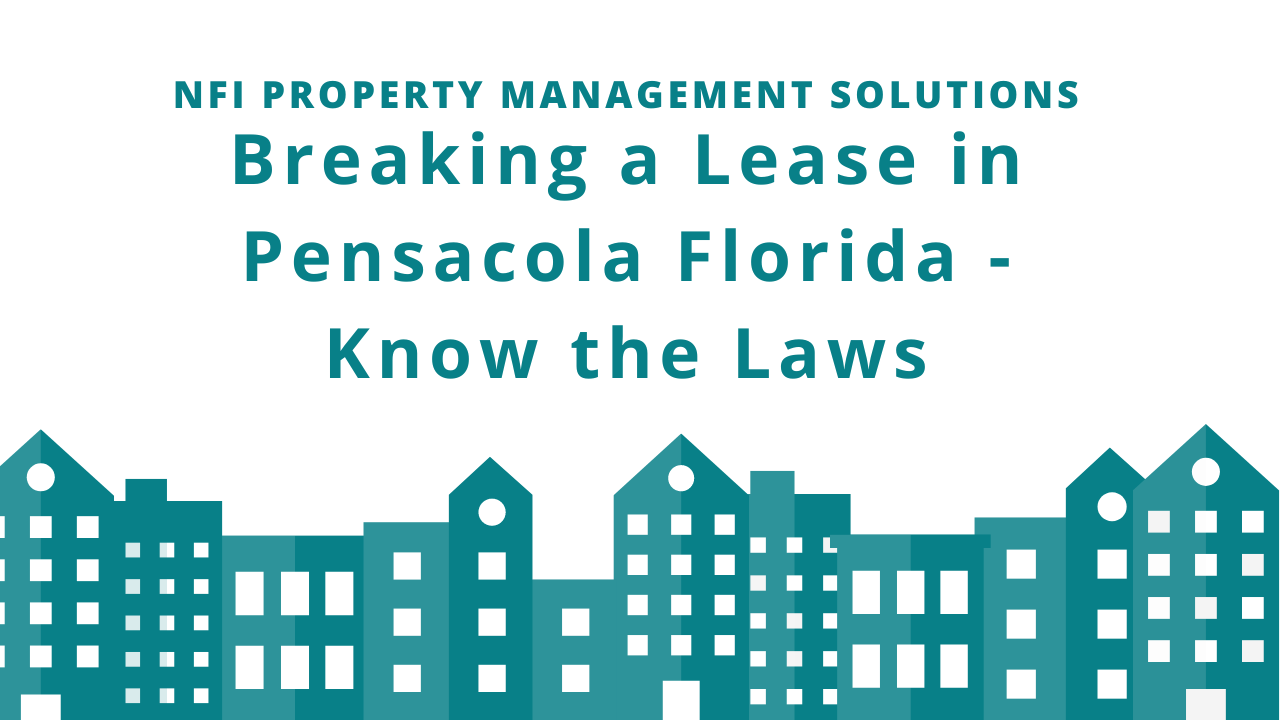
Most tenants who sign a lease in Florida usually intend to occupy the rental property for the entire lease agreement term, rather than move elsewhere before the fixed term lease expires. However, life and circumstances change and a renter may be forced to break their lease in Florida before they expected too. The tenant's request can cause their landlord some stress!
As a landlord in Florida, knowing about Florida’s Landlord-Tenant Law and what to do in this scenario is key as it can help landlords avoid potential legal issues with Florida tenants in their rental property.
When it comes to lease breaking or early lease termination, the lease procedure a landlord must follow is informed by a tenant’s reason to break a lease as well as any proper notice given by Florida tenants.
Some reasons a renter wishes to break a lease or provide written notice that is legally justified, such as active military duty, or inhabitable units, whereas others aren’t, such as finding a new rental property, or moving closer to family.
If your new Florida tenant has a legally justified reason to break the lease earlier than expected, then they have a right to terminate their tenancy without being penalized per Florida law.
On the other hand, if the tenant’s reason isn’t legally justified, then you may be able to hold them liable in small claims court for paying the rent due for the remainder of the lease term. A tenant's security deposit might be redeemable to you if they're found guilty for breaking a lease in florida early without just cause.
In the following article, you’ll learn everything you need to know about Florida law and breaking a lease early. This includes renter rights that allow them to terminate or break their lease early legally, reasons to break a lease that aren’t legally justified in a Florida court of law, and whether state law requires Florida landlords to mitigate damages.
Conditions that Allow a Tenant to Break their Lease Early in Florida Legally
According to Florida real estate law, tenant rights alllow the renter to legally break even a very solid lease early without lease penalty in the following circumstances.
The Lease Permits It
Some Florida rental owners intentionally include an early termination clause in their florida lease agreement in case of lease breaking.
When writing the early termination lease clause into the rental agreement in florida, landlords often include certain conditions, which if met, relieve the new renter of any further rent obligation for the rest of the lease period and allow them to break a lease without further liability.

Generally, landlords who include an early termination fee clause usually require that the tenant bear the cost of a penalty fee and provide advance notice that they will be not be paying rent. Understand whether it's legal to withhold a security deposit in this instance.
The Tenant is Starting Active Military Service
Service members who are either deployed or relocated for active military duty can legally break a rental lease in Florida. The Servicemembers’ Civil Relief Act protects these Florida tenants from the day they enter active duty to between 30 to 90 days after discharge.
This protection under the Civil Relief Act is limited to service members. Florida defines service members as members of the Armed Forces, Commissioned Corps of the Public Health Service, Commissioned Corps of the National Oceanic and Atmospheric Administration, and the Activated National Guard.
As per this law, tenants must first fulfill specific requirements before moving out of rental units and ending their lease period.
They are as follows.
- The tenant must have signed the lease in florida before entering military service or signed the rental agreement during active military duty and then received a permanent change of station orders.
- The tenant must meet lease termination notice requirements by providing their landlord written notice in advance of their intention to move out with attached deployment letters from their commanding officer.
When these qualifications are met and written notice is provided, the earliest the lease can be terminated is 30 days after the first date of the next rent cycle.
The Unit is No Longer Habitable
Florida, like most states, has specific Florida health and safety codes that every landlord must abide by. If a landlord fails to maintain these habitable housing standards or violates Florida health laws, especially after being notified by their tenant, a tenant might be able to not only break a lease, but take action against the landlord.
For example, broken locks on the unit's doors renders the premises unsafe for tenants and might lead tenants to break their lease agreement or rental agreement. State law requires landlords to make repairs within 20 days after being notified by their tenant. If they do not pay repairs to the premises, landlords might have to pay legal fees.

The following are your tenant’s options if their landlord ignores their maintenance requests, particularly those affecting their habitability.
- Withholding rent owed until you make the repairs.
- Repairing the issue and then deducting the costs from future rent payments.
- Pursuing legal action for damages that may have resulted from the habitability problems.
- Reporting you to public health officials for action.
- Breaking the lease agreement or rental agreement.
Obviously, none of these options are good for your reputation as a landlord or your bottom line. That’s why it’s important to inspect your unit on a routine basis and respond to maintenance issues promptly so that all health and safety violations are avoided during a tenancy.
Fla. Stat. 83.51 details the steps a landlord must take to provide a habitable home for their renters in order to avoid any of their tenants wanting to break a lease.
Violating Tenant Privacy
A tenant in Florida have a right to enjoy your rental in peace and quiet. That means Florida landlords cannot enter the premises without providing their tenant with 12 hours of advance notice prior to entry. If the landlord repeatedly violates this law, or refuses to provide notice, there may be cause for tenants to terminate the tenancy before the lease period ends.
The only exceptions to the advance notice requirement for a landlord are as follows.
- In the event of an emergency.
- If the tenant is absent from the apartment or rental for a long period of time.
- Your tenant unreasonably withholds consent.

When a landlord enters the rental property, they must do so within the hours of 7:30 am and 8:00 pm. However, the landlord may enter the unit outside these hours provided both the landlord and their tenants agrees to another convenient time or in the event of an emergency like domestic violence, they can do so without notice.
Harassing Your Tenant
There are certain things a landlord cannot do. When a landlord violates these florida laws they are considered serious enough to be deemed landlord harassment. Landlord harassment is a legally justified reason to for breaking a lease agreement in Florida.
The following are some examples of actions that may constitute as harassment.
- Making sexual advancements toward your tenant.
- Threatening your tenant with physical violence.
- Refusing to accept or even acknowledge a rent payment from a tenant.
- Removing your tenant’s belongings from the unit.
- Locking your tenant out of the rental property.
- Shutting down necessary amenities such as heat, water, or electricity.
Reasons for Breaking a Lease that are Not Legally Justified
On their own, the following reasons don’t offer enough justification to relieve a Florida renter of their obligation to pay rent to their landlord for the duration of the lease.
- Relocating to a new home.
- Relocating for a new job.
- Upgrading or downgrading their home.
- Moving in with a partner.
- Moving out due to separation or divorce.
Landlord’s Duty to Re-Rent
Unlike other states, Florida doesn’t require rental owners to mitigate damages after a breaks their lease early. Therefore, a landlord has the right to wait until the lease ends before holding the tenants liable to pay for remaining rent under the lease.
Bottom Line
Knowing your legal rights and responsibilities as a landlord when breaking a lease is important to your success as a landlord! You should also remain informed of the legal eviction process, rent increase rules and other property-related policies. However, keeping up with federal law, state regulations and legal amendments and changes can be challenging for a new landlord!
For assistance in lease breaking, navigating Florida Landlord Tenant Law, or any other aspect of property management, such as collecting security deposits, reach out to NFI Property Management Solutions today! Our team is ready to help you achieve your goals and increase your ROI.
Disclaimer: This blog isn’t a substitute for expert legal advice. Also, laws change, and this post might not be updated at the time of your reading. If you have any legal questions or concerns please reach out to a licensed attorney.